Curious Human
Astro + Keystatic + Markdoc
Migrating to Astro + Keystatic
Hello from Astro!
Last week, I re-wrote my website, porting it from a custom Markdoc build solution to a new solution that leverages Astro and Keystatic. This is a short summary of my journey.
Motivation
A couple of years ago I ripped out Next.JS and MDX from my personal website, unhappy with the fact that my users had to download React and related framework JS for what was a very simple and primarily text-based website. I replaced it with Markdoc and a couple of small build and compile scripts. You can read more about that journey, and the performance gains I got from doing that.
Everything so far has worked wonderfully. I write my posts in markdown either in iA Writer or directly on GitHub . The changes I make against the GitHub repo automatically trigger a new Vercel build and deployment. The build and deployment takes < 1 minute. Just commit a new Markdoc file to the repo and you have a new blog post. Simple and effective.
What I loved about this solution was that I wrote the build scripts, compiler, templates, etc. myself and did not have to rely on hardly any libraries / frameworks for implementation. I am a minimalist. My site was about as minimal as it gets. There was no third party libraries to maintain other than Markdoc, and honestly I could never have updated that library and it would have been fine. This made my code very resilient to changes. And to me that's a huge win. The less tooling I use, the less there is to maintain, the more the solution will last amidst all the new hotness that may surface in web dev land one day and be gone the next.
But there's been a few pain points:
- Routing and templating: my very simple templating solution at the moment works fine and could be extended further, to support more advanced routing and templating, but I'm busy lately and I'm feeling pretty lazy about that.
- Editing content: I like writing my first drafts of things in iA Writer or Vim (with the vim-pencil plugin), but sometimes I want to make a change using a WYSIWYG editor, particularly when adding images.
I wanted to solve these pain points, but with the same hard requirements I had two years ago:
- Performance: the solution must deliver outcomes that are at least as fast as what I have today… which, given that I've basically eliminated most JS from my delivered site, is very fast.
- Resilience: the solution must be resilient to changes in the industry over time, and be portable to other technologies or a simple custom build script as a fallback.
I was happy to discover that others with a great deal more money and time than me have also been working on leveraging Markdoc to deliver blazing fast content websites with minimal JavaScript. Enter Astro + Keystatic.
Astro
Astro is self-described as a framework but it's unique among other frameworks in that it ultimately produces HTML and CSS and only JS when / as necessary. It achieves this through an island-based architecture. In a way, it's a much grander extension of my initial idea. It has support for routing, can do hybrid apps that are statically generated as well as server side rendered and client hydrated, and has wonderful opinions about integrations with web-components. It's simple to get the hang of and has a really ergonomic approach to routing and templating.
Keystatic
Keystatic is a file-based CMS by Thinkmill that leverages Markdoc to allow you to live edit content on GitHub or your local file system in a very cool way. With Keystatic, you can spin up a fairly robust CMS that gives you a great interface and workflow for creating and editing and Markdoc-based content. It's awesome. And makes content management with markdoc super easy.
Here's a quick example of what it looks like editing this very post in Keystatic:
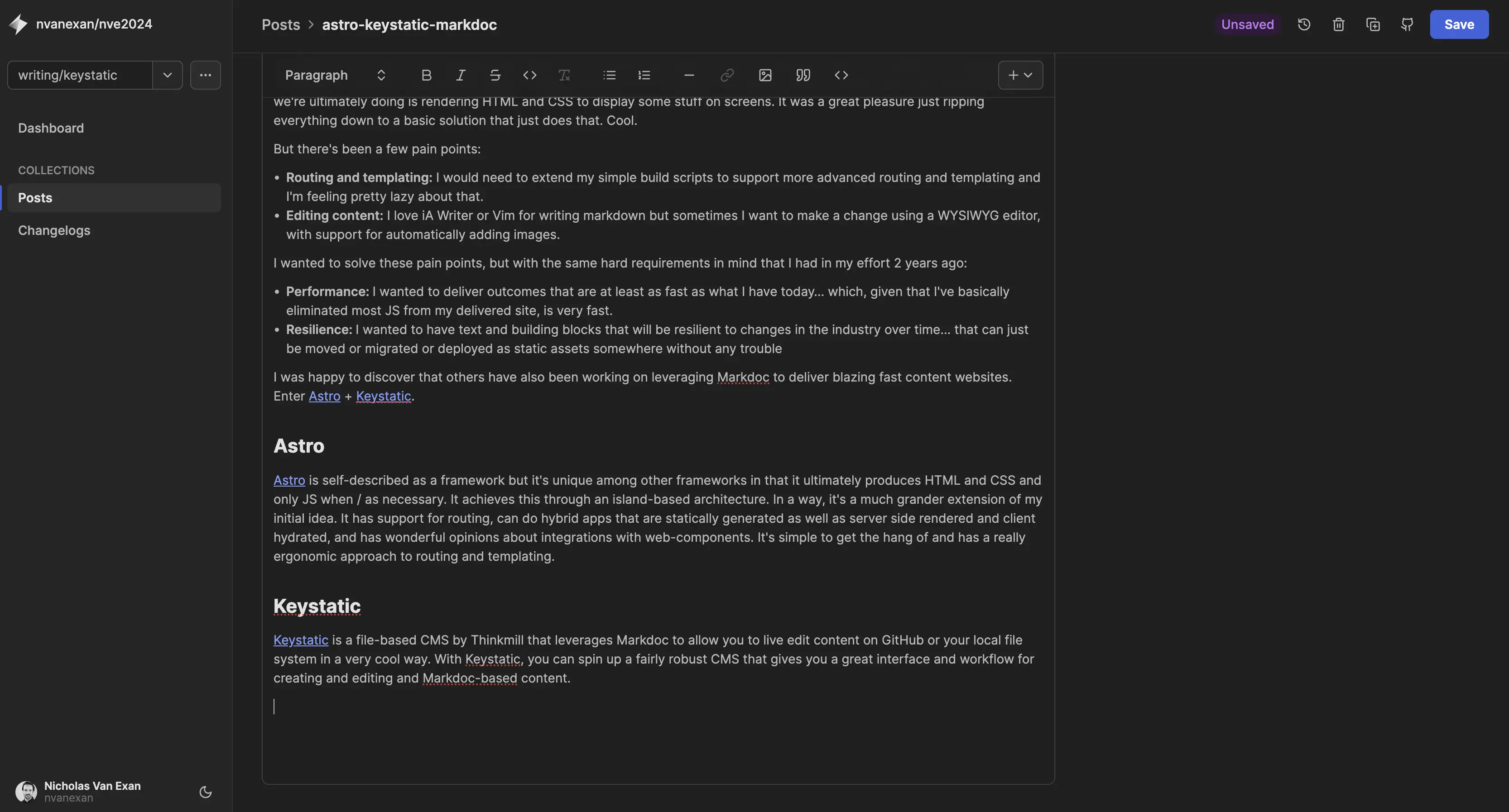
Bringing It All Together
Migrating my existing Markdoc site to a solution based on Astro and Keystatic was pretty straightforward. I created a new repo based on the Keystatic Astro quick start. I then set up my Keystatic schemas and copied over my existing Markdoc files. This was mostly just a matter of copy-paste, with a couple of tweaks to some frontmatter fields. Resilient technologies ftw!
The one thing that Astro + Keystatic's Markdoc implementations lacked, however, were support for parsing footnotes and highlights. The Markdoc team does not favour augmenting their parser to parse these items, preferring instead for users of Markdoc to write their own custom tags.1
I am not in favour of this approach for three reasons: (1) I find Markdoc tag syntax less ergonomic than basic markdown syntax; (2) the Keystatic approach to dealing with custom tags inside of a rich content editor in the CMS, via its componentBlocks API, is a bit too rudimentary for my liking at this point; and (3) the way iA Writer renders markdown in its app is how I also render markdown on my site, and so if I open a Markdoc file in iA Writer for content authoring or editing, I want to see the same renderings for highlights and footnotes.
Here's an example of how iA Writer interprets and renders highlights and footnotes...
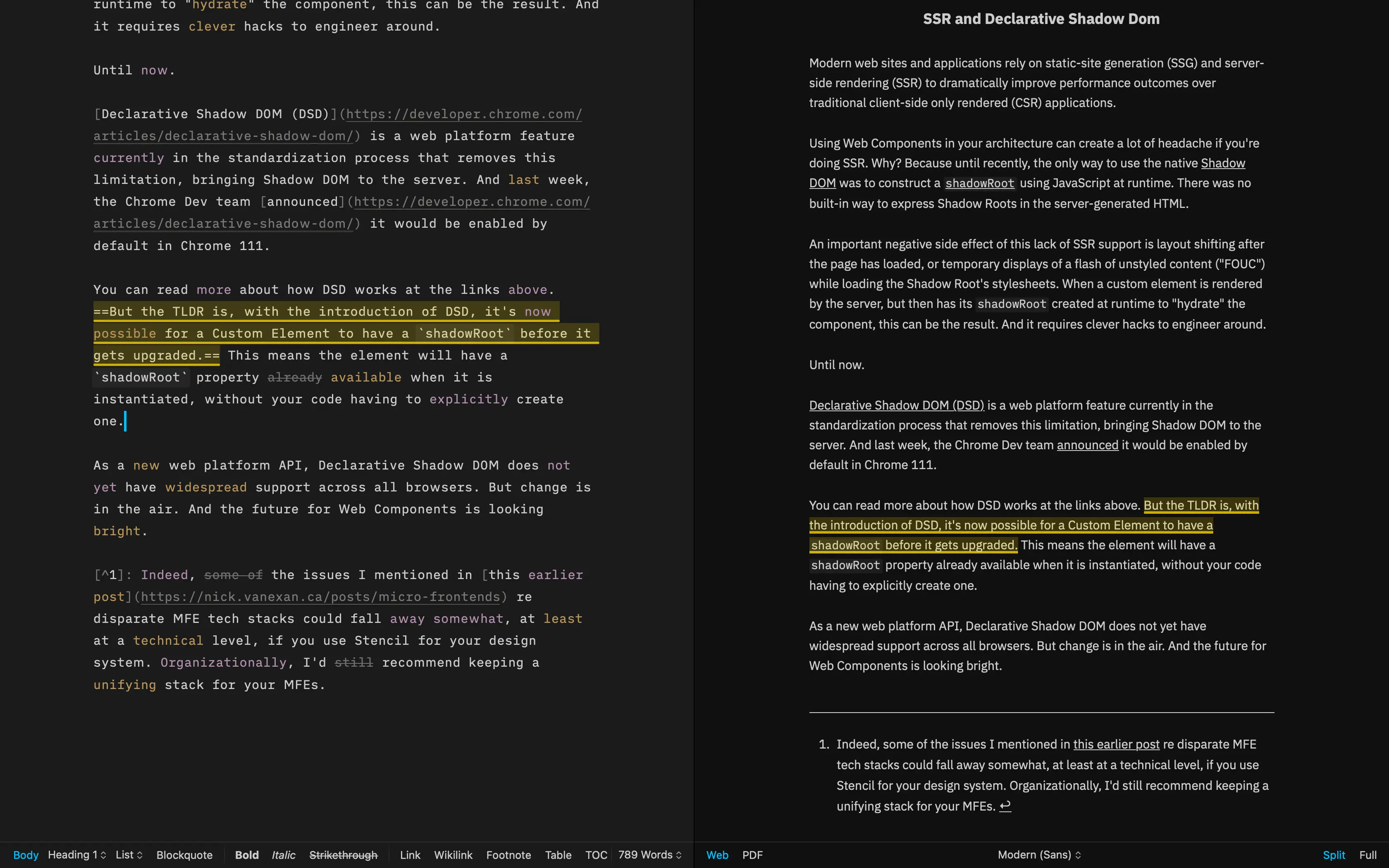
I succeeded in getting my desired result without custom Markdoc tags by taking the custom parsing logic I wrote for my existing site and publishing it as an NPM package (@nvanexan/markdoc-extensions). This package just has a simple parser that extends the existing Markdoc parser with optional support to also parse highlights and footnotes. I simply import this package into my new site's repo, and then patch-package the @astrojs/markdoc library, substituting my extended parser for the vanilla Markdoc parser. Works like a charm.
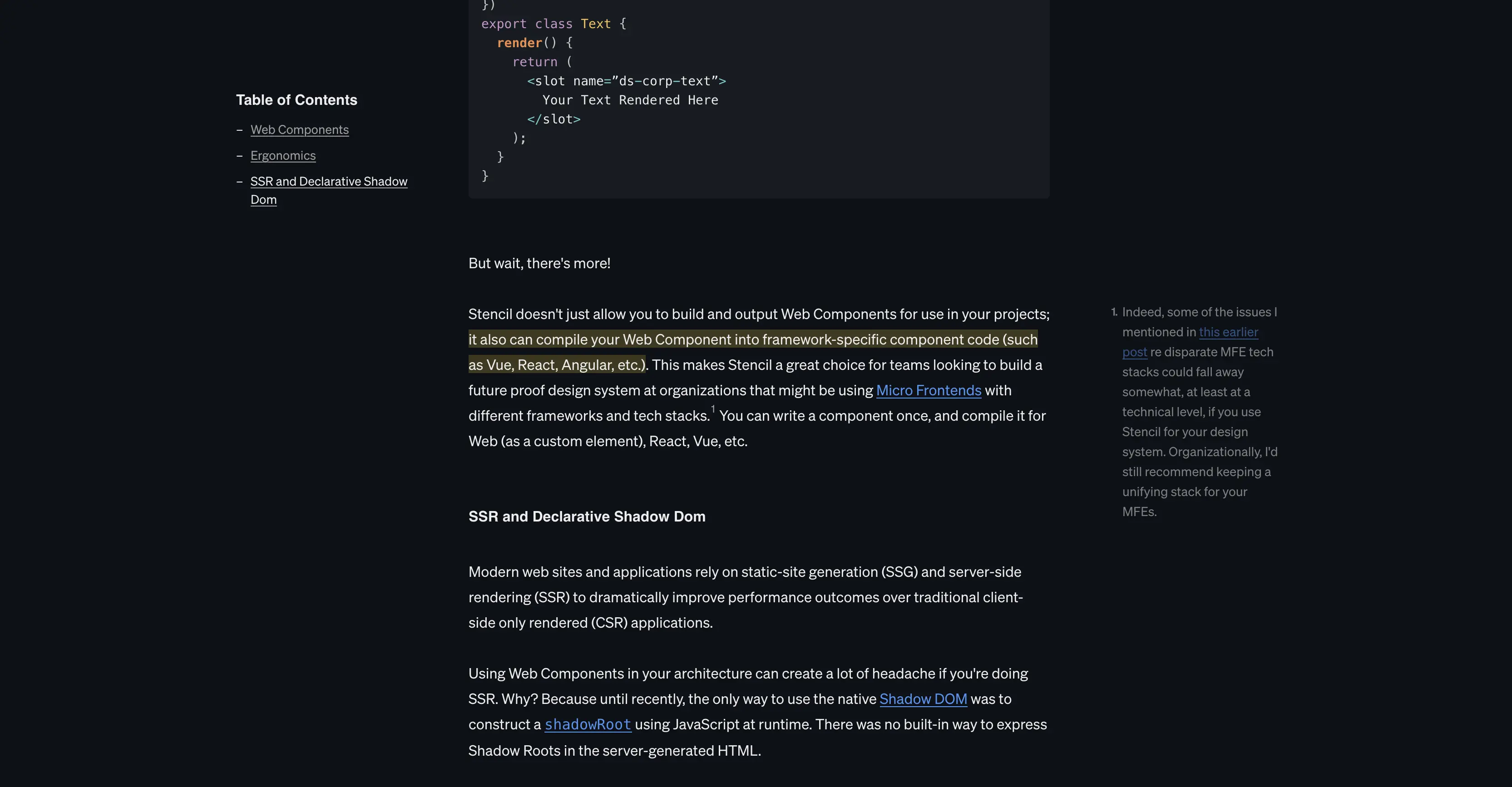
Results and Performance
I am very happy with the results of this experiment. I now have a nice CMS-like editing experience when I want it, with the flexibility of still being able to edit and author content in my repo directly even without Keystatic, because it's just Markdoc at the end of the day. Resilience!
What about performance? I am thrilled to see that the lighthouse scores I achieved two years ago when I ripped out Next.JS and MDX and replaced with my own Markdoc solution are still maintained. Here's a comparison of all three versions of this site (Next.JS, Markdoc custom, Astro + Markdoc).
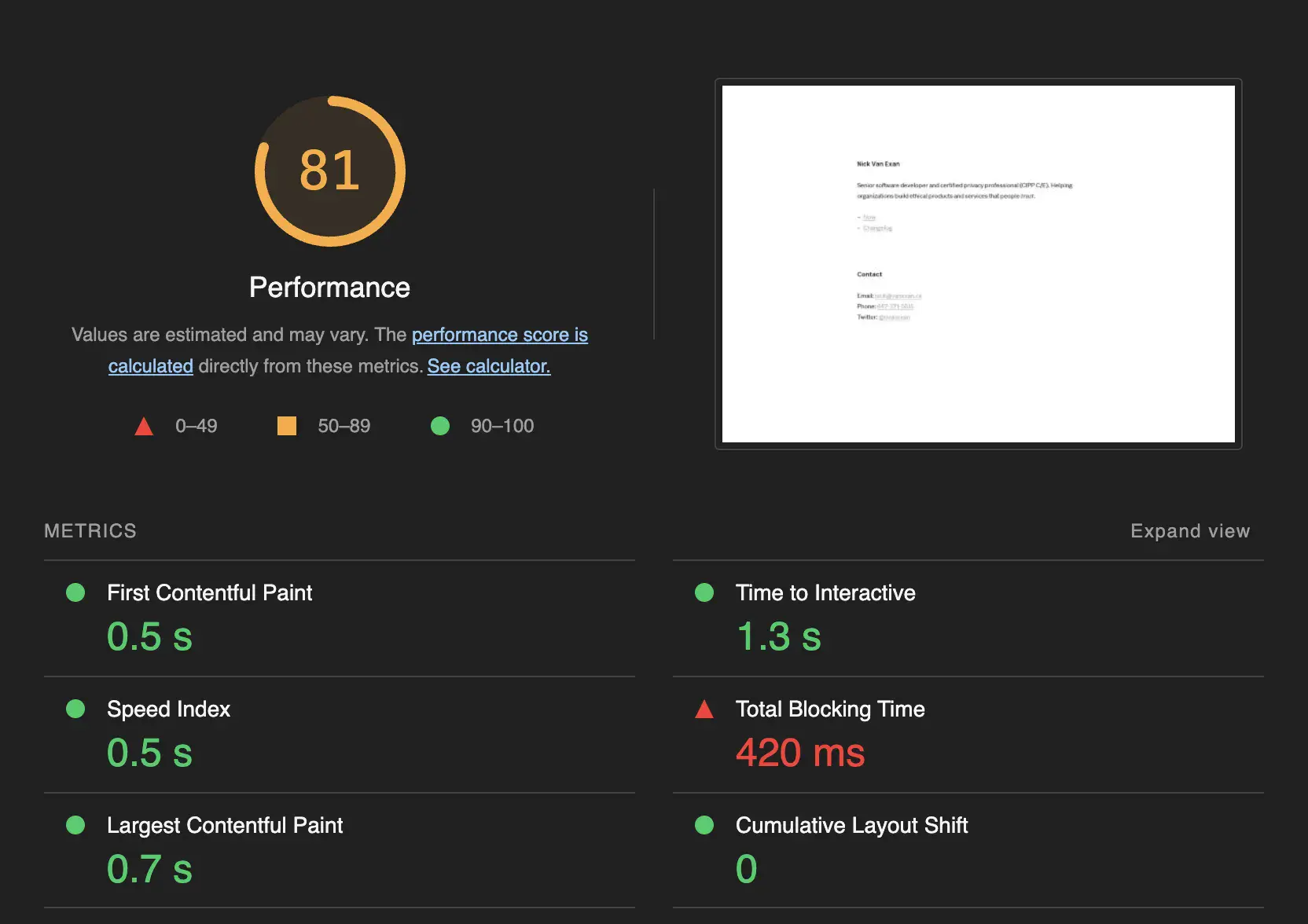
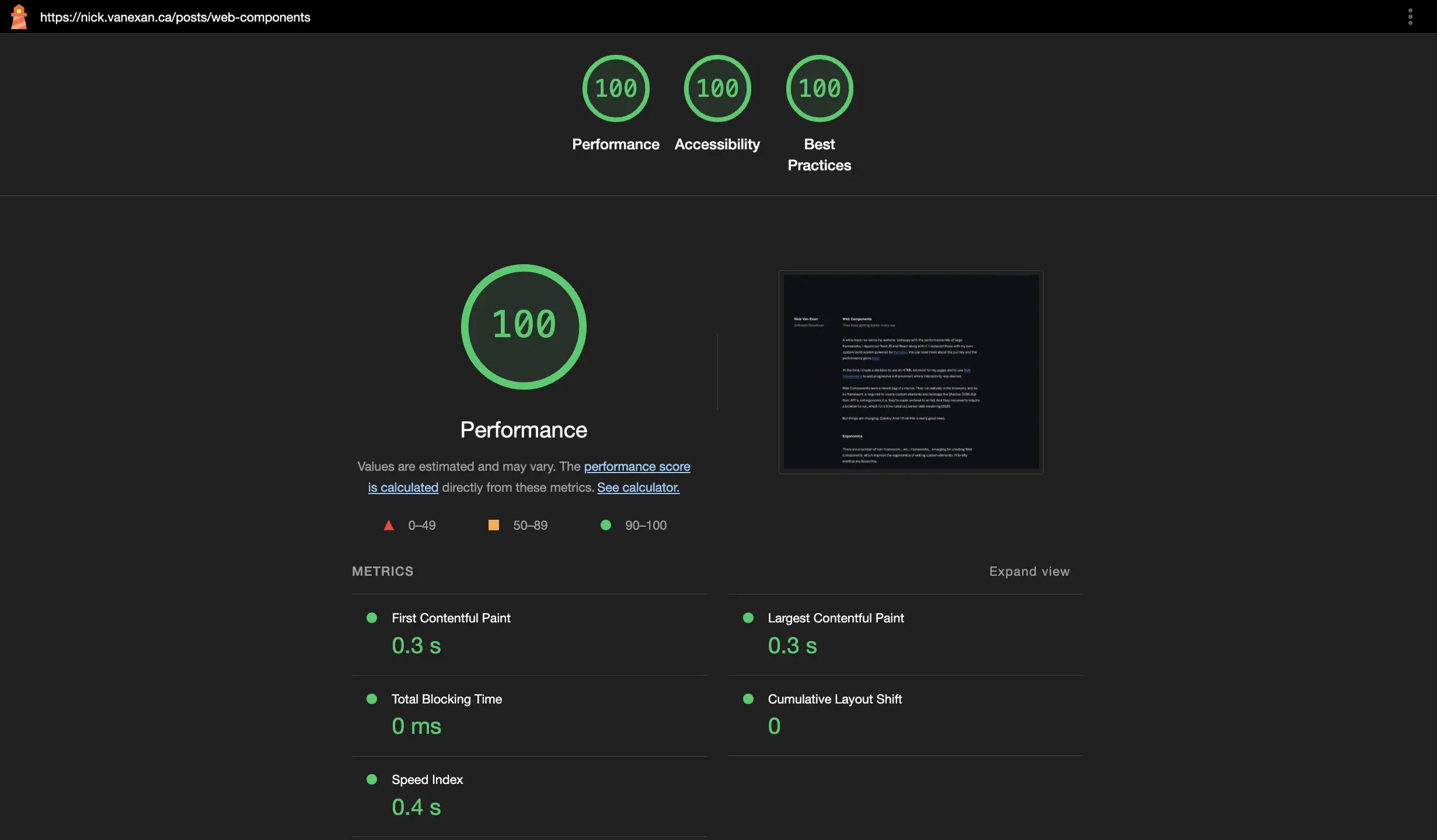
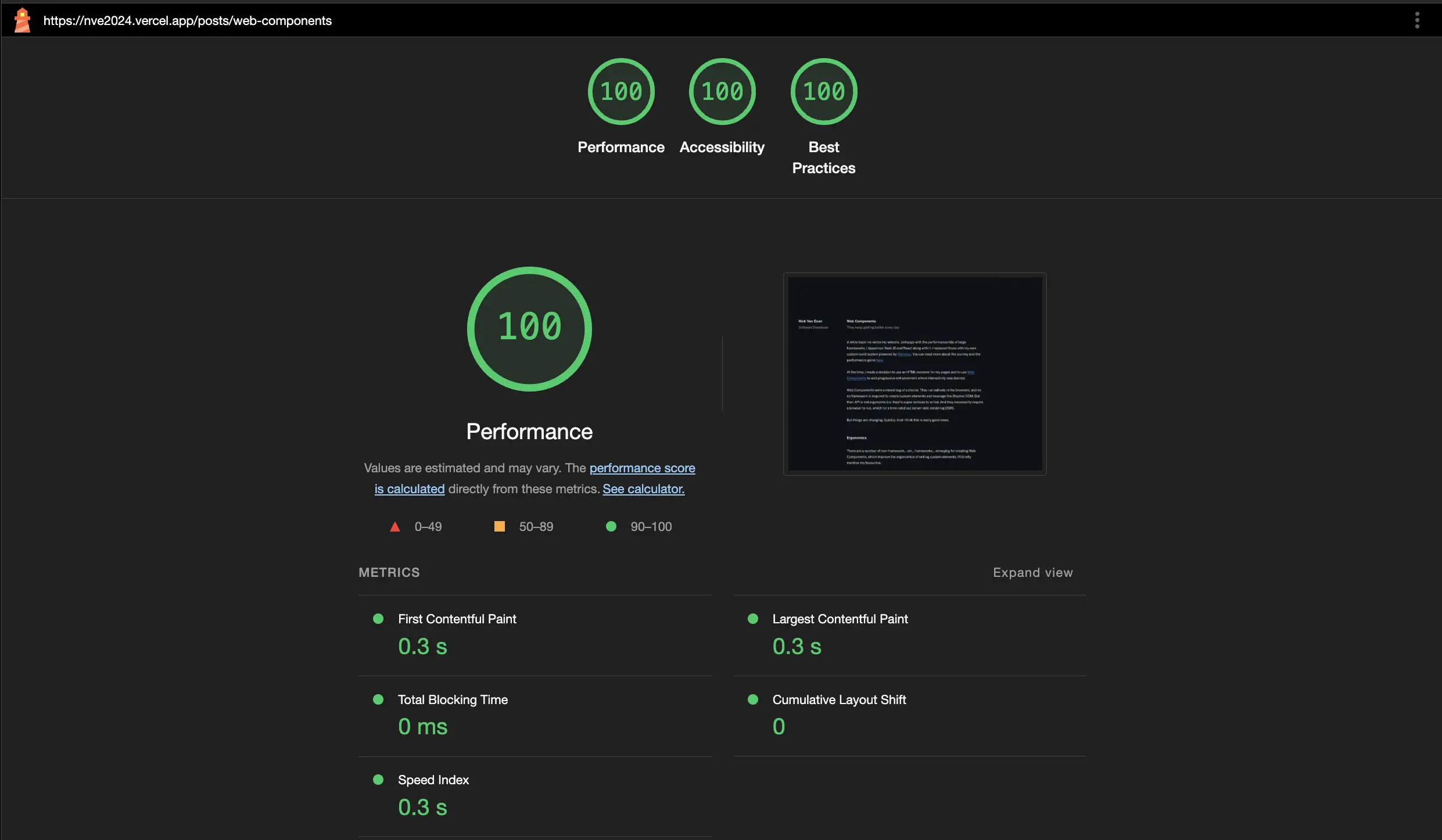
Concluding Thoughts
Porting my site to Astro was really easy, because I had started with a resilient Markdoc-based solution. I am a bit uncomfortable about the maintainability of an Astro-based solution (thinking of my experience with GatsbyJS for example of how promising framework ideas can go sideways pretty quickly) but it was a perfect quick win to give me some CMS-like capabilities without having to sacrifice performance. I think I can summarize my thoughts on this tech as follows...
- Astro: the best framework out there right now for building content-based websites with killer performance.
- Keystatic: a really good CMS-like experience for small marketing and personal sites like this one, with a lot of potential for larger sites to come with the development of Keystatic Cloud.
- Vercel: the best deployment solution for web sites and apps out there right now, from automated preview builds on PRs, to collaboration and commenting on live preview builds, etc.
- Markdoc: a super powerful innovation on markdown, and I think a fairly resilient piece of tech for year to come given its portability and growing popularity in frameworks like Astro.
- See issue 70 and my pull request 40 in the Markdoc repo for more details.↩